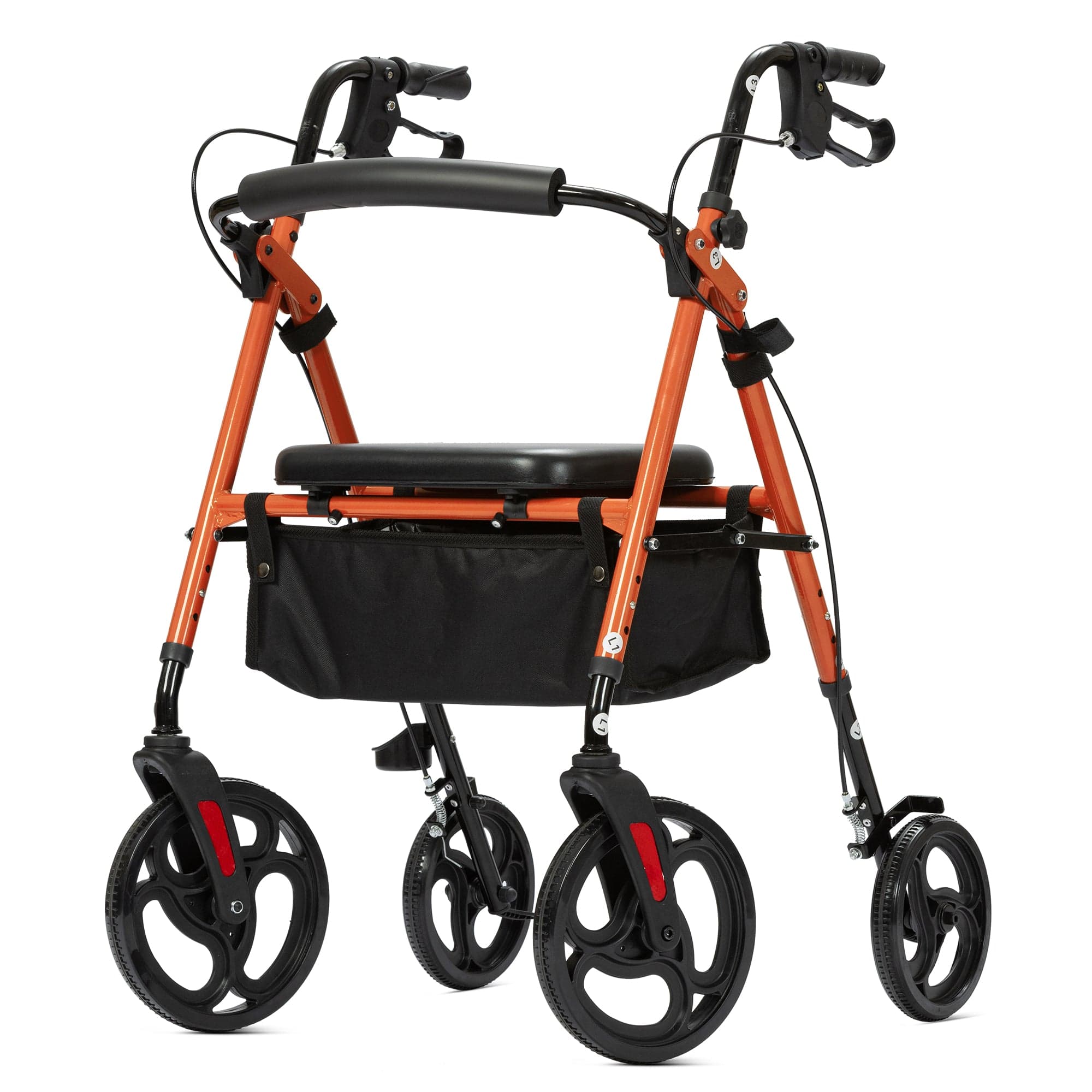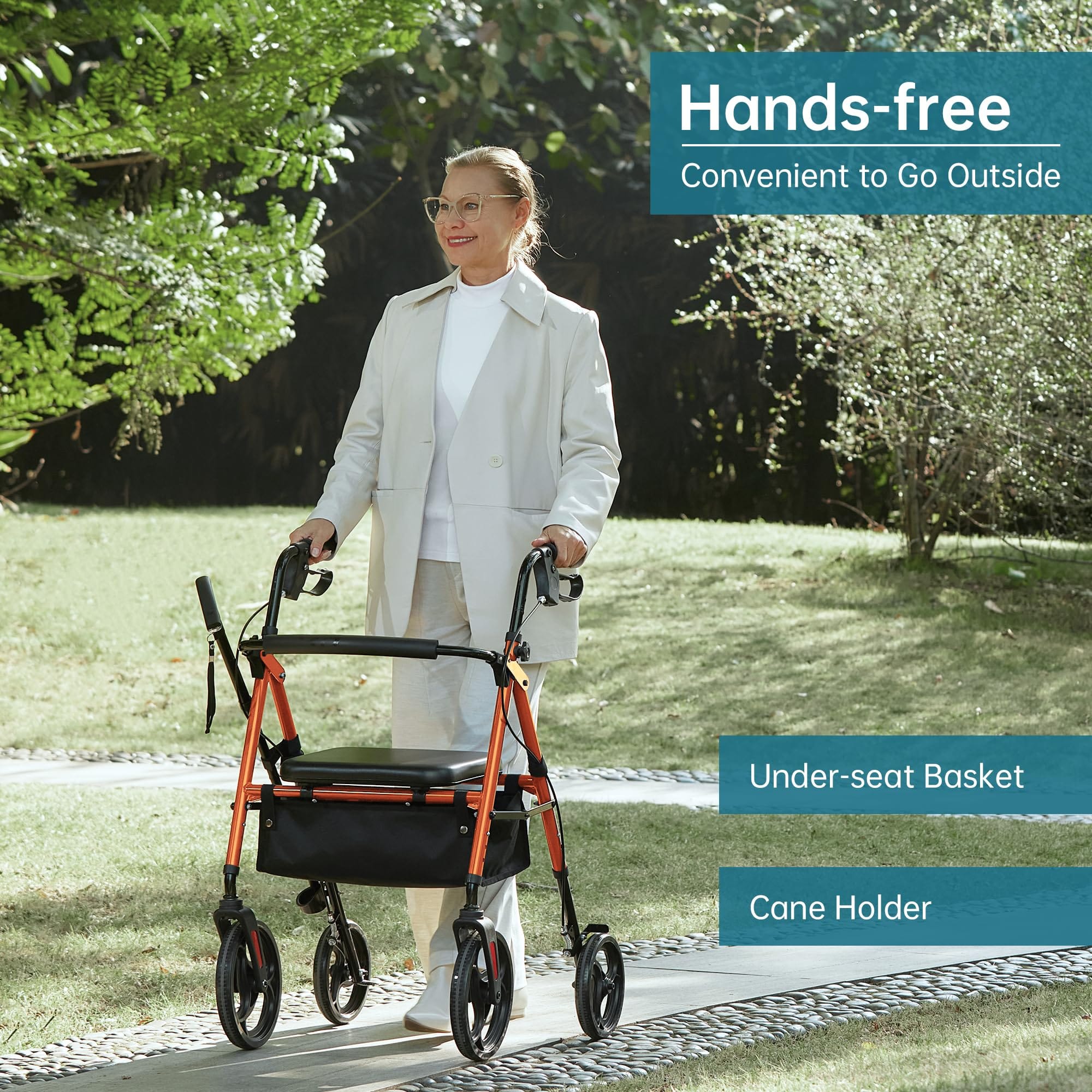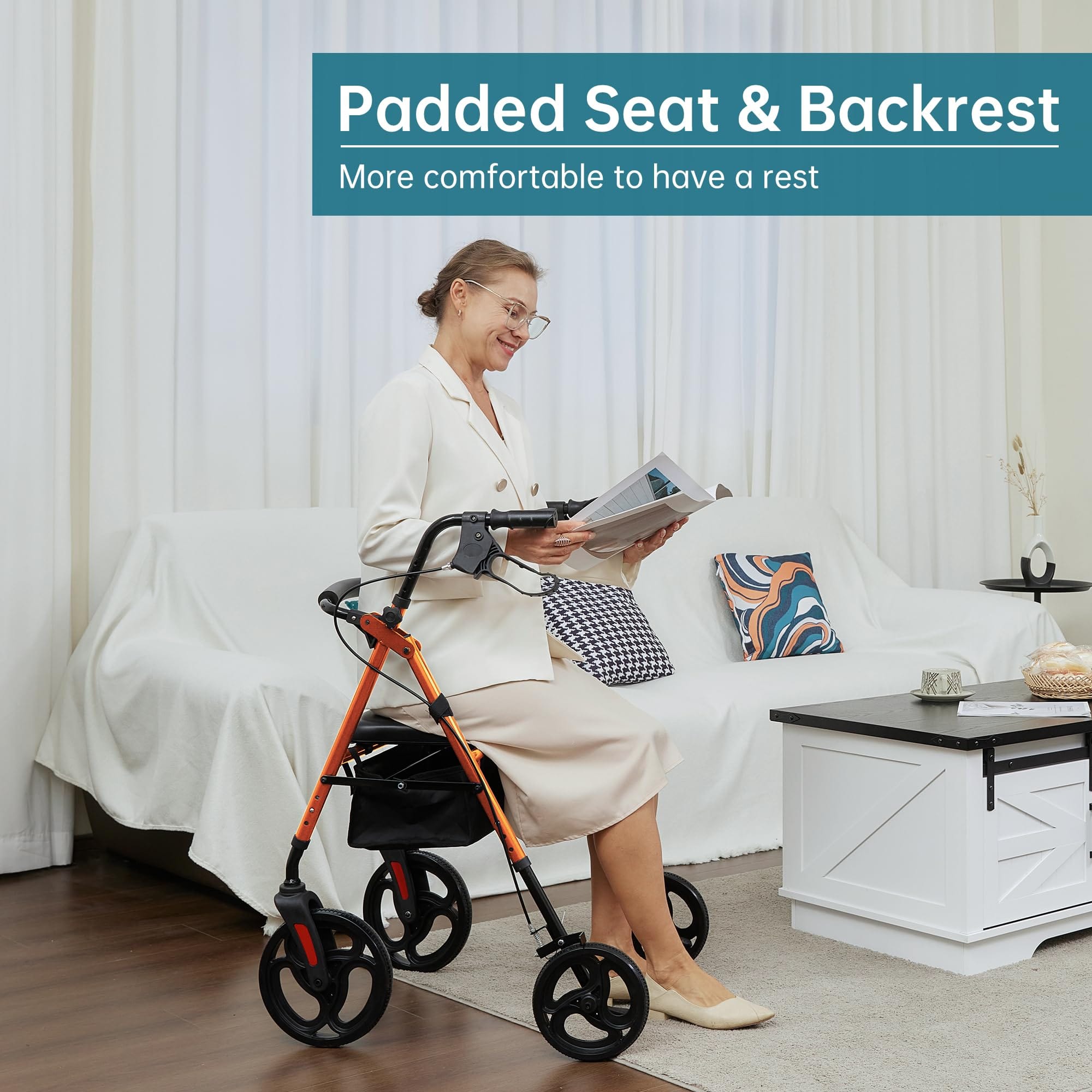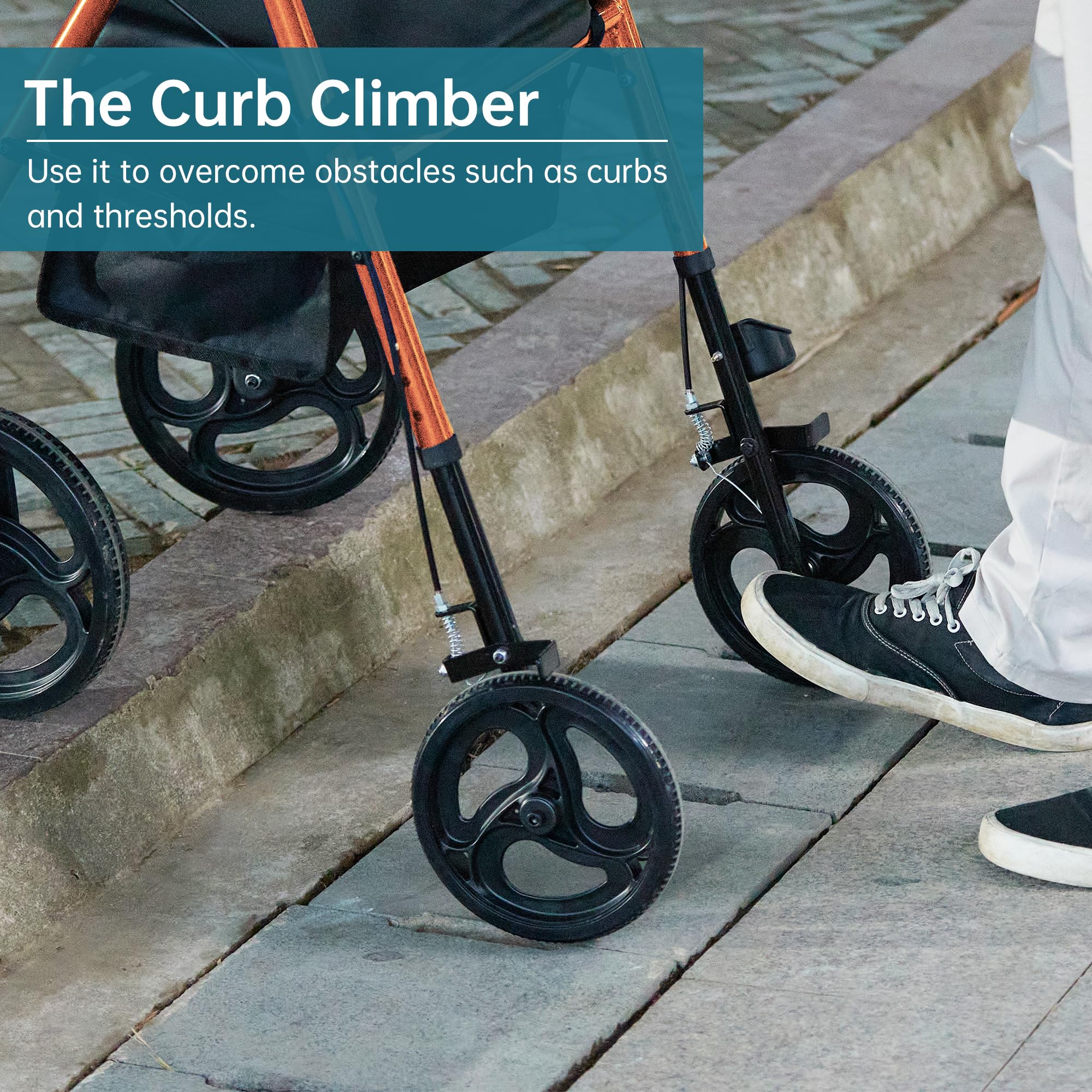Can a Rollator Help with Alzheimer's Disease?
Apr 08, 2025
Let’s face it—Alzheimer’s is tough. It’s hard on the person going through it, and it’s just as tough on the people who love and care for them. Memory loss, confusion, and physical changes can turn simple daily routines into real challenges. So if you're here wondering whether a rollator walker could make things a little easier, you're not alone—and yep, we’re gonna break it all down.
First Off, What’s a Rollator Walker?
Before we look into, let’s make sure we’re all on the same page. A rollator walker is basically a supercharged walker. Unlike standard walkers that you have to lift and move, rollators have wheels—usually four of them—plus brakes, a built-in seat, and often a storage pouch or basket.

ELENKER YF-9007B Rollator Walker with 10” Wheels, Sponge Padded Seat and Backrest, Fully Adjustment Frame for Seniors Orange
You might’ve seen them in the wild—people cruising through the grocery store with their rollators, or taking a break on the seat in the park. They’re designed for people who need some help with balance or stamina but still want to move around on their own.
Now let’s talk about how that can be helpful for someone living with Alzheimer's.
How Alzheimer’s Affects Mobility
When most people think of Alzheimer’s, they think about memory problems. And sure, memory loss is the big one, but Alzheimer’s also affects coordination, balance, and movement—especially in later stages. Things like walking, turning, or even getting up from a chair can become difficult and, let’s be real, kind of scary.
As mobility becomes more of an issue, the risk of falls goes way up. And we all know how serious falls can be, especially for older adults.
That’s where a rollator walker with seat can really come in handy.
So... Can a Rollator Help?
Short answer? Yes, in many cases, a rollator walker can definitely help someone with Alzheimer’s. But it’s not a one-size-fits-all thing—there are a few things to think about before picking one out.
Let’s go over the perks first:
1. Better Stability and Safety
This is the biggie. A rollator gives the user something steady to hold onto while walking. It can help prevent stumbles and falls, which is huge for someone whose coordination is a little off. The wheels glide smoothly, and the brakes make stopping easy, especially on uneven ground.
Want to go a step further? Look into an all terrain rollator for outdoor use. These have thicker wheels that can handle grass, gravel, and bumpy sidewalks.

ELENKER YF-9007B Rollator Walker
2. Rest Whenever, Wherever
Here’s a cool thing about most rollator walkers—they come with a built-in seat. If the person using it gets tired (which can happen quickly with Alzheimer’s), they can just stop and sit down. No searching for a bench or chair. That freedom can make a short walk or outing a whole lot more comfortable.

ELENKER YF-9007B Rollator Walker
3. Boosts Confidence
Imagine not trusting your own body or being scared to walk across the room. It’s frustrating, right? A rollator walker helps restore some of that lost confidence. It gives the user a feeling of control. Even just moving from the kitchen to the living room becomes more doable—and less stressful.
4. Supports Daily Activity
Staying active is still super important for people with Alzheimer's. Movement can help with sleep, digestion, mood—you name it. A rollator encourages gentle daily walking, which keeps the body engaged and the mind a little sharper.
But Hold Up—There Are Some Things to Watch For
While rollators have a lot of benefits, they aren’t always the perfect solution for everyone with Alzheimer’s. Here are a few things to keep in mind:
1. Cognitive Load
Some people with mid-to-late stage Alzheimer's might struggle to remember how to use the rollator properly. They could forget to lock the brakes before sitting, or they might push it too fast. This isn’t to say they can’t use one, but they may need supervision at first.
2. Learning Curve
Rollators are user-friendly, but they’re still a new thing to learn. A physical therapist or caregiver might need to help them get used to it—especially when it comes to braking and turning.
3. One Size Doesn’t Fit All
You’ve gotta find the right fit. Height, handle grip, seat comfort—all that matters. And if you’re heading outdoors a lot, a walker with wheels that can handle rougher ground (like an all-terrain rollator) might be your best bet.

ELENKER YF-9007B Rollator Walker
Choosing the Right Rollator for Alzheimer’s
Okay, let’s say you’re ready to shop. Here’s what to look for:
Four wheels: More stability, easier to push.
Loop-style brakes: Easy to squeeze and lock.
Padded seat: Comfy for resting.
Storage basket or pouch: Helpful for snacks, water, or personal items.
Adjustable height: So it fits just right.
Bright or labeled features: For easier visibility.
You’ll find tons of options out there, but brands like the Elenker rollator or Elenker walker are solid choices. They’re known for being sturdy, affordable, and user-friendly, with models that even have trays and cup holders. Pretty sweet, right?
Tips for Caregivers
If you’re a caregiver helping someone with Alzheimer’s use a rollator, here are a few pro tips:
Introduce it slowly—show them how it works, and walk with them until they’re comfortable.
Label it if needed (like “brake” or “sit here”)—visual cues can be super helpful.
Keep paths clear—move rugs, cords, or furniture that could trip them up.
Use it consistently—same time of day, same walking route, same setup.
Routine is key when Alzheimer’s is in the mix.
So, can a rollator walker help someone with Alzheimer’s?
Heck yes—if it’s the right fit, and they get a little help using it at first. It’s not just about walking easier. It’s about keeping someone you love moving safely, confidently, and as independently as possible.
From indoor strolls to outdoor fresh air adventures, the right walkers with wheels—especially one with a seat—can make a world of difference. Whether it’s a basic model or something a little more rugged like an all-terrain rollator, it’s all about finding what works for them.
And remember, brands like Elenker rollator offer a bunch of great options that are both practical and comfy. So don’t be afraid to explore, test a few, and see what clicks.
At the end of the day, anything that helps your loved one move through life a little more easily? That’s a win.











